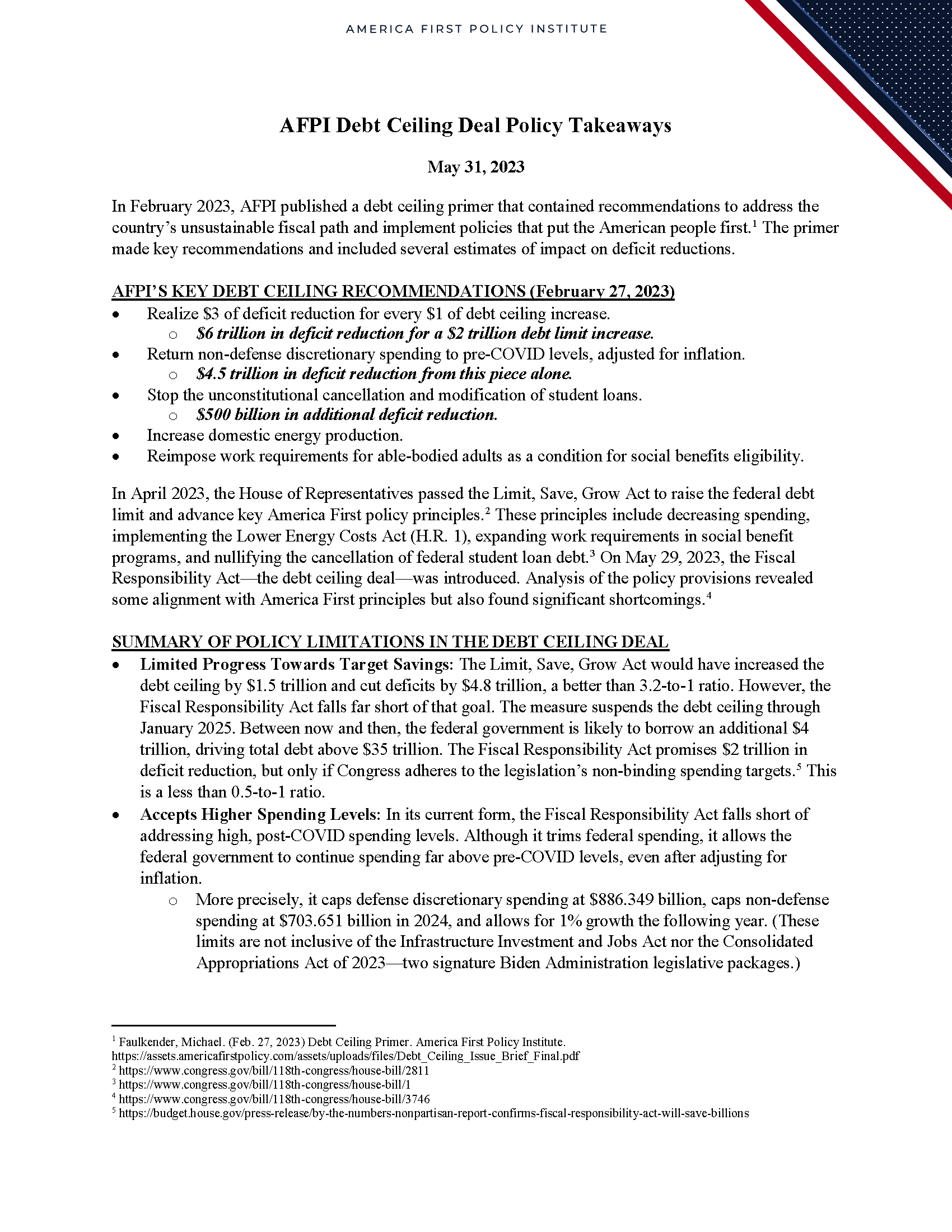AFPI Debt Ceiling Deal Policy Takeaways
In February 2023, AFPI published a debt ceiling primer that contained recommendations to address the country’s unsustainable fiscal path and implement policies that put the American people first.1 The primer made key recommendations and included several estimates of impact on deficit reductions.
AFPI’S KEY DEBT CEILING RECOMMENDATIONS (February 27, 2023)
- Realize $3 of deficit reduction for every $1 of debt ceiling increase.
- $6 trillion in deficit reduction for a $2 trillion debt limit increase.
- Return non-defense discretionary spending to pre-COVID levels, adjusted for inflation.
- $4.5 trillion in deficit reduction from this piece alone.
- Stop the unconstitutional cancellation and modification of student loans.
- $500 billion in additional deficit reduction.
- Increase domestic energy production.
- Reimpose work requirements for able-bodied adults as a condition for social benefits eligibility.
In April 2023, the House of Representatives passed the Limit, Save, Grow Act to raise the federal debt limit and advance key America First policy principles.2 These principles include decreasing spending, implementing the Lower Energy Costs Act (H.R. 1), expanding work requirements in social benefit programs, and nullifying the cancellation of federal student loan debt.3 On May 29, 2023, the Fiscal Responsibility Act—the debt ceiling deal—was introduced. Analysis of the policy provisions revealed some alignment with America First principles but also found significant shortcomings.4
SUMMARY OF POLICY LIMITATIONS IN THE DEBT CEILING DEAL
- Limited Progress Towards Target Savings: The Limit, Save, Grow Act would have increased the debt ceiling by $1.5 trillion and cut deficits by $4.8 trillion, a better than 3.2-to-1 ratio. However, the Fiscal Responsibility Act falls far short of that goal. The measure suspends the debt ceiling through January 2025. Between now and then, the federal government is likely to borrow an additional $4 trillion, driving total debt above $35 trillion. The Fiscal Responsibility Act promises $2 trillion in deficit reduction, but only if Congress adheres to the legislation’s non-binding spending targets.5 This is a less than 0.5-to-1 ratio.
- Accepts Higher Spending Levels: In its current form, the Fiscal Responsibility Act falls short of addressing high, post-COVID spending levels. Although it trims federal spending, it allows the federal government to continue spending far above pre-COVID levels, even after adjusting for inflation.
- More precisely, it caps defense discretionary spending at $886.349 billion, caps non-defense spending at $703.651 billion in 2024, and allows for 1% growth the following year. (These limits are not inclusive of the Infrastructure Investment and Jobs Act nor the Consolidated Appropriations Act of 2023—two signature Biden Administration legislative packages.
- Although the legislation includes spending targets for several years following FY25, those targets are non-binding and, therefore, are little more than window dressing.
- It rescinds $28 billion of unspent COVID funding, approximately half of what the House called for in the Limit, Save, Grow Act.
- Only Partial Work Requirements: Limited work requirements for Supplemental Nutrition Assistance Program (SNAP) and Temporary Assistance for Needy Families (TANF) recipients represent important policy achievements but should be implemented more broadly than, for example, the five-state pilot program that was proposed.
- Limited Permitting Reform: Though it recognizes the critical need for permitting modernization, the bill falls short of the meaningful reform necessary to resolve excessive, burdensome bureaucratic barriers to much-needed American infrastructure development and economic progress.
- Does Not Stop Unconstitutional Cancellation of Student Loans: The legislation does nothing to block the Biden Administration’s borrower bailout or its scheme to transfer billions in existing debt to taxpayers under the guise of modifications to income-driven repayment programs. It does, however, prohibit the Biden Administration from further extending the student loan repayment pause by executive action.
- Additional Key Policy Considerations:
- The legislation claws back some of the additional spending provided to the IRS via the Inflation Reduction Act while preserving the vast majority of the funding for the hiring of an additional 87,000 IRS agents.
- The PAYGO provision (for quelling the Biden Administration’s regulatory zeal) has no enforcement mechanism. The statute specifically states “The Director may waive the requirements of section 263 if the Director concludes that the waiver — (1) is necessary for the delivery of essential services; or (2) is necessary for effective program delivery.” This determination is explicitly not subject to judicial review. That waiver is entirely granted by the current administration’s OMB Director, which leaves room for broad interpretation and potential misuse.
- The proposal caps the defense budget from FY2024–2029, which, while appealing to overall budget goals, creates potential vulnerabilities for national security that are better addressed by targeted defense reforms to eliminate wasteful spending.
THE BOTTOM LINE
- The Fiscal Responsibility Act, in its current form, limits some federal spending but could go further in advancing America First policy solutions.
- Policymakers seeking to improve the Fiscal Responsibility Act should further reduce federal spending, eliminate funding for the IRS’s additional 87,000 agents, impose work requirements on all able-bodied welfare recipients, block all student loan cancellations and modifications, recoup all unspent COVID funds, and fully implement the Lower Energy Costs Act.
1 Faulkender, Michael. (Feb. 27, 2023) Debt Ceiling Primer. America First Policy Institute. https://assets.americafirstpolicy.com/assets/uploads/files/Debt_Ceiling_Issue_Brief_Final.pdf
2 https://www.congress.gov/bill/118th-congress/house-bill/2811
3 https://www.congress.gov/bill/118th-congress/house-bill/1
4 https://www.congress.gov/bill/118th-congress/house-bill/3746
